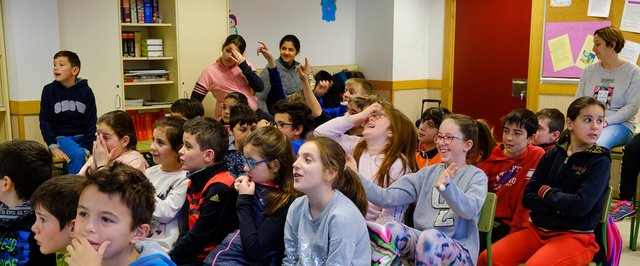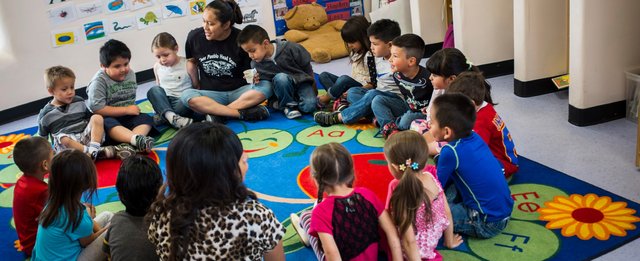The school climate can affect the child's learning
The classroom climate is a fundamental factor in the learning process. It is characterized by responding to the emotional needs of students such as: self-respect and respect for others, personal growth, identity and self-esteem, satisfactory coexistence, affectivity of the teacher, among others. In fact, the lack of a good climate in the classroom has an impact on the students' performance, a problem that today represents a concern for teachers and parents.
We can say that the school social climate is the set of psychosocial characteristics of a school, determined by those factors or structural, personal and functional elements of the institution that, integrated, confer a style of their own to that school, conditioning at the same time of the different educational processes. The studies conducted in different contexts, speak of a direct relationship between a positive school climate and variables such as performance, acquisition of cognitive skills, effective learning and development of positive attitudes towards study. On the other hand, several authors point out a very important relationship between the perception of the school social climate, the emotional and social development of students and teachers.
Related the perception of school quality of life is also related to the capacity of retention of schools. This quality of school life would be associated with the feeling of general well-being, the feeling of confidence in one's own abilities to do school work, the belief in the value of what one learns in school, the identification with the school, the relationships with the partners and the relationships established with the teachers.
The current educational system and society in general face the enormous challenge of improving the school climate in the classroom. An adequate school climate has a very positive effect on all aspects related to the school, the teaching staff and the students; conversely, an inadequate school climate contributes to a decrease in the student's academic performance, negatively influences the adequate social development of the student, can increase the demotivation of the teaching staff, etc. Psychology in general and, especially, Educational Psychology can contribute in a very positive way to improve it.
Learning and teaching in the classroom take place above all, through interpersonal communication between teachers and students. The context in which this communication is produced is constructed and negotiated through verbal and non-verbal communication. Communication is useful in all human activities: work, study, coexistence. Hence the importance of developing this ability to achieve a favorable classroom climate where experiences and knowledge are shared. One of the characteristics that the teacher must possess is the ability to communicate his ideas and for this he must take into account the following:
- Learn to listen.
- Give value to words, that is, fulfill when something is said or promised.
- Use clear and appropriate language.
- Use examples to illustrate, clarify or understand an idea.
- Consider feelings and emotions through empathy to understand the feelings and interests of students.
- Worry because the other person understands what you want to communicate.
The climate of the classroom is constituted by a series of elements that have to do with the emotional needs satisfied and a series of rules of coexistence that maintain an affective learning environment. Regarding emotional needs, one of the primordial elements that must be met is respect for oneself and others; that is, both teachers and students deserve respect and that for no reason religion, culture, language, socioeconomic status, should be discriminated against. Everyone has their own value; all human beings have the same dignity and have the same rights. Appreciation goes with respect. Teachers and students need to be appreciated, not for what they have, but for what they are, that is why it is important to create a climate of the classroom where each member of the group feels appreciated and accepted.
Another element is the personal growth of each member of the group. Each member must increase their knowledge, learn skills and abilities that serve them to improve their quality of life, cultivate values, and improve their training in a gradual manner, since not all members of the group-class, have the same needs and interests , as well as the same rhythm of learning.
The student must feel safe, when the competences of each area are reached and this is the teacher's task. With a good planning you will know where the learning processes are going, how you are going to do them and if you have reached the objectives, also keep in mind that not all children advance at the same pace, so you should create spaces to attend particular cases and in this way support them when they have any difficulty in their learning.
At present, the topic of school climate is taking on greater importance in the social and school environment, not only at the national level but also at the international level because there is a climate of violence that is perceived within schools almost daily and there is also a clear requirement in the improvement of learning. The factors that influence the academic performance of students, the most relevant is the school climate or classroom climate, ie, that classroom in which the teacher has a good relationship with students, students do not fight continuously with each other and there is an accepted and applied discipline, it has a greater positive effect on learning. In this way, it is considered that an adequate school climate promotes communication and collaborative work between the different actors. When there is a certain level of harmony, adequate channels of communication, recognition and encouragement to the different actors, there is a high level of satisfaction and expectations that are met with the achievements.
From the social point of view it is important because the perception of the school climate according to the students shows the level in which this school climate occurs and the results could be applied to design and develop preventive strategies that will help us to improve and prepare them to cope with better strategies of success to a changing and violent society. In addition, promoting coexistence in school is a task that involves the entire educational community, is not the responsibility only of one or some of its members directors, teachers, assistants, tutors, students, etc., but it is the result of actions and values shared by the whole community in daily living. Only when there is consistency between the educational values proposed by the school, those developed by the family and those present in public opinion, do the students find the norms to be adopted appropriate.


